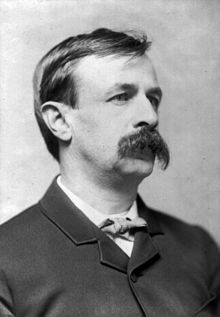|
|
Previous page
Bellamy, EdwardFor other uses, see Edward Bellamy (disambiguation).
Edward Bellamy (26 March 1850 – 22 May 1898) was an American author and socialist, most famous for his utopian novel, Looking Backward, set in the year 2000.

Edward Bellamy, circa 1889.
[edit] Biography
[edit] Early life
Edward Bellamy was born in Chicopee Falls, Massachusetts. His father was Rufus King Bellamy (1816–1886), a Baptist minister and a descendant of Joseph Bellamy. His mother was Maria Louisa (Putnam) Bellamy, a Calvinist. Her father, Benjamin Putnam, had also been a Baptist minister, but had to withdraw from the ministry in Salem, Massachusetts, following objections to him becoming a Freemason.[1] He had two older brothers, Frederick and Charles. He attended Union College, but did not graduate. While there, he joined the Theta Chi Chapter of the Delta Kappa Epsilon fraternity. He studied law, but left the practice and worked briefly in the newspaper industry in New York and in Springfield, Massachusetts. He left journalism and devoted himself to literature, writing both short stories and novels. He married Emma Augusta Sanderson in 1882. The couple had two children, Paul (b. 1884) and Marion (b. 1886).
He was the cousin of Francis Bellamy, most famous for creating the Pledge of Allegiance.
[edit] As a writer
Main article: Looking Backward
According to Erich Fromm, Bellamy's novel Looking Backward is "one of the most remarkable books ever published in America." [2] It was the third largest bestseller of its time, after Uncle Tom's Cabin and Ben-Hur: A Tale of the Christ.[2] In the book, Julian West, an upper class man from 1887, awakes in 2000 from a hypnotic trance to find himself in a socialist utopia. The book influenced a large number of intellectuals, and appears by title in many of the major Marxist writings of the day. "It is one of the few books ever published that created almost immediately on its appearance a political mass movement." [3] "Bellamy Clubs" sprang up all over the United States for discussing and propagating the book's ideas. This political movement came to be known as Nationalism.[4] His novel also inspired several utopian communities. Although Looking Backward is unique, Bellamy owes many aspects of his philosophy to a previous reformer and author, Laurence Gronlund, who published his treatise "The Cooperative Commonwealth: An Exposition of Modern Socialism" in 1884.[5]
Bellamy's second utopian novel, Equality, published in 1897, continues the story of Julian West as he adjusts to life in the future. Although Equality was less successful commercially or culturally than its prequel, a short story "The Parable of the Water-Tank" from Equality, was popular with a number of early American socialists, reprinted in various editions as a propaganda pamphlet.
Several hundred additional utopian novels were published in the US from 1889 to 1900, due in part to the popularity of Looking Backward. [2][6]
Bellamy died from tuberculosis at his childhood home in Chicopee Falls.
[edit] Works
[edit] See also
- Dutch Bellamy Party
- Edward Bellamy House
[edit]
- 'Edward Bellamy's Religious Thought', by Joseph Schiffman, Transactions and Proceedings of the Modern Language Association of America), Vol. 68, No. 4 (Sep., 1953), p 716
- ^ a b c Edward Bellamy, Looking Backward 2000-1887. Introduction by Eric Fromm. New York: Signet, 1960. ISBN 0-451-52412-8
- (Fromm, p vi). 165
- Edward Bellamy ("What 'Nationalism' Means." "The Eclectic Magazine of Foreign Literature" Vol. 52, No. 3. Sept. 1890, pg. 289)
- A Brief Story Of Utopian Socialism In Action (Wayne D. Sneath, American Culture Studies 1890s course, Spring 1996) [1]
- The Year 2000: A Critical Biography of Edward Bellamy (Sylvia E. Bowman,New York: Bookman Associates, 1958; page 107)
[edit] Further reading
- Bellamy, Edward. Looking Backward: 2000–1887 with a foreword by Erich Fromm, Signet, 1960.
- Bellamy, Edward. The Religion of Solidarity, Arthur E. Morgan, ed., Antioch Bookplate Company, 1940. Published posthumously; concerns the idea of love of man and human solidarity.
- Bellamy, Edward. Apparitions of Things to Come: Edward Bellamy's Tales of Mystery & Imagination, collection of short stories, ISBN 0-88286-165-4.
- Franklin, John Hope. "Edward Bellamy and the Nationalist Movement," The New England Quarterly, Vol. 11, December 1938, 739-772.
- Goldbach, Karl Traugott. "Utopian Music: Music History of the Future in Novels by Bellamy, Callenbach and Huxley," in Utopia Matters. Theory, Politics, Literature and the Arts, Fátima Viera and Marinela Freitas, eds. Editora da Universidade do Porto, 2005, pp. 237–243.
- Kapell, Matthew. "Mack Reynolds' Avoidance of his own Eighteenth Brumaire: A Note of Caution for Would-Be Utopians." Extrapolation, Vol. 44, No. 2 (Summer): 201-208.
- Morgan, Arthur E. The Philosophy of Edward Bellamy, King's Crown Press, 1945.
- Sadler, Elizabeth, "One Book's Influence: Edward Bellamy's Looking Backward" The New England Quarterly, Vol. 17, December 1944, 530–555.
[edit] External links
| Persondata |
| Name |
Bellamy, Edward |
| Alternative names |
|
| Short description |
|
| Date of birth |
March 26, 1850(1850-03-26) |
| Place of birth |
Chicopee Falls, Massachusetts |
| Date of death |
May 22, 1898(1898-05-22) |
| Place of death |
Chicopee Falls, Massachusetts |
|
Books By This Author
|
|
|